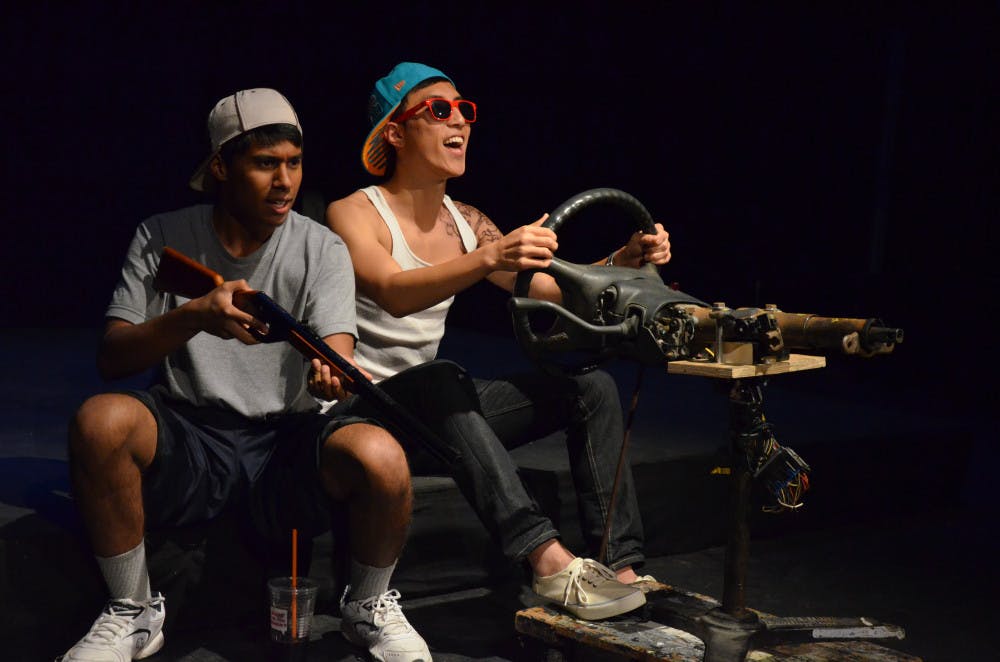What does it mean to be an adult? At what age do you turn old? How are we supposed to deal with the passage of time? Twenty-three Middlebury first-year and sophomores spent the weekend exploring these questions in this year’s first-year show, “Life Under 30.”
This weekend’s performance marked the eighteenth annual first-year show. The show was designed to introduce new students to theater at the College; first-years do not have the opportunity to act in a faculty show their first semester because auditions for fall faculty shows are held the preceding spring. The first-year show creates a unique opportunity to put on a play with mostly freshmen actors — a perfect cast for a show about growing up.
The show consisted of seven 10-minute plays that explored the meaning of adulthood. The plots ranged from a young woman struggling with a job application that asked her about her “favorite childhood memory,” to a girl dealing with her changing identity after being raped, to two grocery store employees cleaning up the mess made when an old man fell in the aisle and cracked his skull. The cast was talented — highlights included the still intensity in Caitlyn Meagher’s ’17 performance of “Dancing With a Devil,” the banter between Oliver Wijayapala ’17 and Wenhao Yu ’17 in “Drive Angry,” and the communicative energy of the cast. One of the most memorable parts of the show was the ensemble work.
As the audience filtered in, the cast sat on the stage, talking over music reminiscent for millenials of early teenage years. The play began when a cast member entered slowly, carrying a sign that read “an adult.” She handed it off to another seated cast-mate and a game of hot potato began as each actor tried to foist the sign off onto someone else. Panic ensued and the cast scattered, going offstage and coming back with other written questions about adulthood, such as “Have you ever been in love?” and “What do you want to do with your life?” The director, Visiting Lecturer in Theatre Lisa Velten-Smith, said that the creation of this opening sequence was “last-minute,” but it didn’t feel that way. The energy of the cast and the use of written rather than spoken language set a powerful tone for the rest of the show.
The questions from the opening sequence were raised periodically throughout the show in video clips of interviews played during scene transitions. Velten-Smith explained that each cast member had gone out and interviewed someone about adulthood using questions the cast had discussed. One question was “What age do you turn old?” to which the interviewee in the video clip responded, “When you feel old?” and then, uncertainly, “25?”
“I think the theme of the show is so apt for us as college students figuring out who we are and what we want to do with our life,” said cast member Aashna Aggarwal ’16. “I also think that in today’s age, we as young adults have experienced a lot we weren’t exactly prepared for and the show highlights how we’re in the same boat. I definitely relate to it and I think the audience can too; whether it’s with just one play or all of them.”
Velten-Smith said that this is why she picked the play. She wanted both the actors and audience members to be able to relate to the theme. She stressed the importance of asking questions like “Why are we doing this play?” and “Who specifically in the audience will this speak to?”
“I am excited about this play because I feel that everyone is searching for their place in the world,” said Velten-Smith. “Where do I fit in? And that’s why you’re at college, you’re there to discover and reveal.”
Beyond its immediate relatability, “Life Under 30” touched on some important social issues. One of the plays, “Drive Angry,” was about a boy who had gotten cancer from a polluted environment. The video clip that came before this play featured a girl who was asked “What scares you about the future?” She replied, “It scares me that I might fail at saving the environment.”
“One of the strengths of theater is the fact that is raises social consciousness,” said Velten-Smith, “and one of the great things about this particular scene — ‘Drive Angry’ — is that that message is not delivered in a heavy-handed way. So it’s two-fold: you get an entertainment value out of it while also a really important message is being delivered. Theater is for social change, not just for pure entertainment, not just for yourself. Theater has existed for thousands of years for a reason.”
“Life Under 30” exemplifies a piece of theater that touches on issues close to the hearts of many different people.
“Every scene for me had something that spoke to someone in the audience,” said Velten-Smith. “For example, the guys in ‘Forty Minute Finish’ contemplating their own existence. Anyone in the audience could be going through an illness or a death. They could really benefit from looking at it through a different perspective. Or the girls in ‘Dancing With a Devil.’ It’s a very intense journey that the character goes through and she needs to go through it to make the discovery that she does at the end. There could be that girl out there in the audience that needs that hope in the end.”
First-Year Show Asks How to Grow Up

Comments



